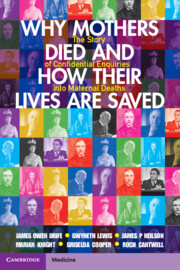 Why Mothers Died and How their Lives are Saved
Why Mothers Died and How their Lives are Saved Book contents
- Why Mothers Died and How Their Lives Are Saved
- Why Mothers Died and How Their Lives Are Saved
- Copyright page
- Contents
- Contributors
- Foreword
- Foreword
- Introduction
- 1 Historical Background
- 2 THE FIRST STEPS: 1900–1939
- 3 How the Confidential Enquiries Evolved
- 4 THE MISSING CHAPTER? PROLONGED LABOUR AND OBSTETRIC TRAUMA
- 5 HOW THE CHANGE BEGAN: THE STORY OF SEPSIS
- 6 Haemorrhage Then and Now
- 7 HYPERTENSION: ENQUIRIES, TRIALS AND RECOMMENDATIONS
- 8 The Story of Abortion
- 9 CHALLENGING TRADITION: THE STORY OF EMBOLISM
- 10 Pregnancy and Illness
- 11 Maternal Death due to Anaesthesia
- 12 Psychiatric Illness
- 13 THE MOTHERS WHO DIED: SOCIAL DETERMINANTS OF MATERNAL HEALTH
- 14 THE LEGACY IN THE UNITED KINGDOM: THE CONCEPT OF ‘NEAR MISS’ AND THE NEED TO KEEP SAVING LIVES
- 15 International Maternal Health: Global Action
- 16 International Action: Personal Views
- Figure Permissions
- Further Reading
- Index
10 - Pregnancy and Illness
Published online by Cambridge University Press: 05 April 2023
- Why Mothers Died and How Their Lives Are Saved
- Why Mothers Died and How Their Lives Are Saved
- Copyright page
- Contents
- Contributors
- Foreword
- Foreword
- Introduction
- 1 Historical Background
- 2 THE FIRST STEPS: 1900–1939
- 3 How the Confidential Enquiries Evolved
- 4 THE MISSING CHAPTER? PROLONGED LABOUR AND OBSTETRIC TRAUMA
- 5 HOW THE CHANGE BEGAN: THE STORY OF SEPSIS
- 6 Haemorrhage Then and Now
- 7 HYPERTENSION: ENQUIRIES, TRIALS AND RECOMMENDATIONS
- 8 The Story of Abortion
- 9 CHALLENGING TRADITION: THE STORY OF EMBOLISM
- 10 Pregnancy and Illness
- 11 Maternal Death due to Anaesthesia
- 12 Psychiatric Illness
- 13 THE MOTHERS WHO DIED: SOCIAL DETERMINANTS OF MATERNAL HEALTH
- 14 THE LEGACY IN THE UNITED KINGDOM: THE CONCEPT OF ‘NEAR MISS’ AND THE NEED TO KEEP SAVING LIVES
- 15 International Maternal Health: Global Action
- 16 International Action: Personal Views
- Figure Permissions
- Further Reading
- Index
Summary
Indirect deaths result from diseases made worse by pregnancy. Their importance increased as reporting improved. In 1991 Michael de Swiet became the medical assessor to the Enquiries. Initially heart disease was the main concern. Rheumatic heart disease may follow streptococcal rheumatic fever. Women can live with it but pregnancy puts a strain on the heart and death may occur during childbirth. In 1952-4 the deaths from heart disease included 37 women giving birth at home. The disease diminished due to penicillin and better social conditions. Women with congenital heart disease were warned against pregnancy but cardiac surgery reduced the risk and obstetricians learned to work with cardiologists. The pattern of disease changed due to smoking and obesity, and myocardial infarction became the main cause of cardiac death. After 1997-9 Indirect deaths outnumbered Direct deaths. Reports highlighted the inadequate management of epilepsy, with poor communication between maternity carers and neurologists, particularly for women in deprived circumstances. The Enquiries’ findings helped to create a new specialty and the Obstetric Medicine Society now runs its own training programme.
Keywords
- Type
- Chapter
- Information
- Why Mothers Died and How their Lives are SavedThe Story of Confidential Enquiries into Maternal Deaths, pp. 124 - 135Publisher: Cambridge University PressPrint publication year: 2023


